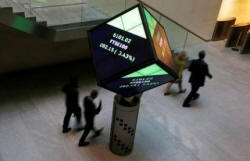|
 Dollar
sits pretty, bond yields rise as Fed bets firm Dollar
sits pretty, bond yields rise as Fed bets firm
 Send a link to a friend
Send a link to a friend
[November 09, 2015]
By Marc Jones
LONDON (Reuters) - The dollar took a
breather on Monday having surged to a seven-month high, while emerging,
commodity and bond markets had a nervy feel after strong U.S. jobs data
boosted bets on a December Federal Reserve rate hike.
|
|
 European and Asian shares both started the week in a subdued mood as
a fresh batch of soft Chinese trade data added to the uncertainty
from what is increasingly expected to be the Fed's first hike in
almost a decade. European and Asian shares both started the week in a subdued mood as
a fresh batch of soft Chinese trade data added to the uncertainty
from what is increasingly expected to be the Fed's first hike in
almost a decade.
Tokyo's Nikkei had leapt 2 percent as the yen fell sharply
against the dollar, and hopes for more stimulus following Beijing's
weak data saw Chinese stocks jump 1.5 percent, but they were
exceptions.
A solid bounce back in German exports was not enough to lift
Europe's main bourses as traders continued to cash in some of last
week's 2-1/2 month highs for the FTSEurofirst.
French carmaker Renault also slid 3.2 percent after the country's
prime minister, Manuel Valls, said on Sunday the government didn't
want a merger between the firm and Japanese partner Nissan.
<7201.T.>

"Market participants are of the view (after strong U.S. jobs data on
Friday) that the worries about the global economy are overdone but
then this weekend we saw some disappointment in the China exports,"
said Emile Cardon, a strategist at Rabobank in the Netherlands.
"Emerging markets are in the doldrums again and that is having a
negative impact on sentiment."
The dollar also saw some modest profit taking against the euro and
sterling in early European deals after its post-payrolls surge,
although it continued to squeeze higher against the yen.
It had advanced to a 2-1/2-month peak of 123.49 yen. The euro was
higher at $1.0772 having struck a 6-month trough of $1.0704 on
Friday.
Some analysts said the ECB's aggressive talk about cutting rates and
more money printing at its last meeting had been because of the
euro's strength - and the fact that it had now fallen back made any
major cuts less likely.
"The lower euro/dollar goes, the less need there is for the ECB to
do more," said BNP Paribas currency strategist Michael Sneyd in
London.
EMERGING PRESSURE
Emerging Asian currencies and stocks, which took the brunt of some
heavy global selling over August and September were back in the
firing line as the prospect of a Fed hike next month loomed ever
larger.
India's rupee slumped to its weakest in more than six weeks
after Prime Minister Narendra Modi's heavy defeat in Bihar's state
elections raised concerns the government would struggle to pass
policy reforms markets have been hoping for.
[to top of second column] |

The Philippine peso also hit a six-year low. The South Korean won,
the Malaysian ringgit and the Thai baht touched one-month troughs.
Indonesia's rupiah fell to its weakest in more than two weeks.
After the U.S. jobs data which saw the largest gain in jobs since
last December and the unemployment rate fall to 5.0 percent, it
lowest since April 2008, interest rates futures were now pricing in
a 70 percent probability that the U.S. central bank will raise
borrowing costs next month.
Treasury yields continued to creep higher in Europe having soared on
Friday. The key 2-year yield, the most sensitive to a near-term rate
hike, was at a 5-1/2-year high. [US/]
Europe's benchmark German Bund yields were being dragged higher too,
while Portuguese government bond yields hit a 10-week high after
leftist parties agreed to form an alternative government to try to
oust the center-right in a vote this week.
There was also uncertainty in neighboring Spain, where Catalan
separatists are expected to approve on Monday in the regional
parliament a motion saying the process to split the northeastern
region from Spain has started.
Among commodities, the strength of the dollar remained the theme.
London copper slipped further below the $5,000 mark towards a
six-year low, after the China trade data underlined struggling
growth in the world's top metals user.

Spot gold struggled near a 3-month low of $1,084.90 an ounce though
oil prices rebounded on bargain hunting as OPEC said it expected
global demand to remain strong next year.
Brent crude had bounced 0.8 percent to $47.81 a barrel by 0945
GMT while U.S crude was up 0.5 percent at $44.55 a barrel.
(Reporting by Marc Jones; Editing by Toby Chopra)
[© 2015 Thomson Reuters. All rights
reserved.] Copyright 2015 Reuters. All rights reserved. This material may not be published,
broadcast, rewritten or redistributed. |